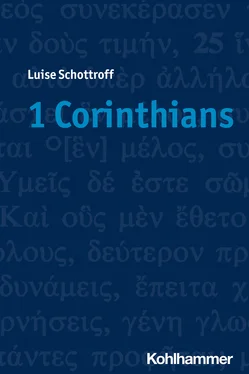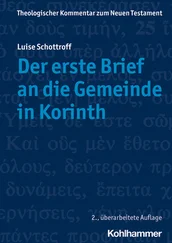2:15People filled with the Spirit have special discernment ( anakrinein ). They understand human hearts 158and everyday experiences. God’s Spirit enables them to recognize the entanglements in which others and they themselves are caught up and to change them. The ultimate judgment about people, however, is left to God alone, and so those filled with the Spirit cannot by judged ( anakrinein ) by anyone, cf. 4:1–4, not even by other people of the Spirit. That does not mean that members of the congregation do not criticize themselves and one another, for the letter is a document of reciprocal critique between Paul and the congregation. This critique, however, is clearly different from God’s judgment. God’s judgment sets boundaries for the mutual critique: God’s Spirit in others is not the object of critique and judgment. And yet all questions about how life is to be lived are to be dealt with in a common interpretation of Scripture and mutual critique.
2:16brings up once again and summarizes the decisive thought of the whole section, the great good fortune to be the sōma Christou . Paul first cites Isa 40:13, »Who has known the understanding of the Eternal One …?« The depths of God (2:10) are hidden from all (cf. Rom 11:34–35). The answer to the rhetorical question from Isa 40:13 in 2:16a is: no one. The same thing is also said in the quote of uncertain origin in 2:9: no eye has seen it; no ear has heard it.
2:16b: And yet »we,« the body of Christ, through God’s care for us (2:12), are gifted with the greatest good fortune (cf. 2:10). As members of the body of Christ we see God face to face (13:12), even if we find ourselves enmeshed in structures of violence, surrounded by suffering and death. We see God’s justice, for which we hope. We hear God’s self-revelation in the words of the Torah. Without God’s power, all that people see is the victory of violence, when they look upon the Crucified One and the crucified. They say: it is not wise to enter into solidarity with those who are crucified (2:14). Those gifted with God’s Spirit see that the Crucified One has been snatched away from death by God, he is risen. We see and experience the resurrection of all the dead, for which we hope. The triumphant brief concluding statement summarizes all that: »We have the understanding/thinking of the Eternal One.« Paul gives importance here to the word nous /mind/thinking (see also 14:14–15 and above on 2:6). God’s gift brings eyes for the resurrection and for God’s new creation, but also the critical mind that searches everything (2:10), even one’s own entanglement in worldwide sin, in the structures of the world (see above 2:6, 8 and the basic information on »The wisdom of this world« at 1:17).
The congregation is the place where God is present. 1 Corinthians is filled with such felicitous assertions (see also the introduction to 3:1–23).
In Isa 40:13 LXX the word kyrios refers to God. In the Pauline response, we find in some Greek manuscripts: We have the mind of the Messiah . Other manuscripts have … the mind of the kyrios . On the basis of texts from Paul’s time, Howard (1977, 80) shows convincingly that people like Paul do not yet replace the Tetragrammaton with kyrios but insert the Tetragrammaton in Hebrew letters into the Greek text. In sentences that then comment on the Scripture quotes, references to the Tetragrammaton were rendered by kyrios . So, in his response to Isa 40:13, Paul can have written kyrios and thereby assumed God (the Tetragrammaton of the citation). In the second century the word kyrios was increasingly applied to Christ. The manuscripts that in this place have Christos instead of kyrios wanted to achieve a greater Christological clarity: »We have the mind of the Messiah«—as a response to the question, »Who has known the mind of the Eternal One?« It must remain hypothetical what Paul wrote in place of the Tetragrammaton. But he did not yet use kyrios for Jesus/the Messiah in the sense of referring to God by using this word. 159It is likely that in his response (2:16b) he was referring to God. In interpreting Paul, the post-Pauline process of Christologizing that is visible here needs to be taken into account. Paul does not understand the Messiah to be a divine figure.
In 3:1–23(and Chapter 4) Paul explains in detail that for which he has laid the foundations in 1:10–2:16, namely, that their common bond with the Messiah Jesus—who was crucified by Rome and raised by the God of Israel, and who is now vibrantly alive in the congregation—has consequences for their life together. Competitive structures and other power struggles for dominance in the congregation are, it is true, depictions of the »world« and its wisdom, but they contradict the Messiah and God’s election of the humble. Paul understands his letter to be a paternal word of encouragement and instruction to address this situation. With 3:1–4 he connects with 1:10–18. He offers a fundamental critique of power struggles in the congregation. His principal goal is that the congregation takes seriously the divine riches with which the body of Christ has been gifted, and he draws from them the power to bring about justice. The great expressions of encouragement are core elements of this paternal word of instruction in 1:10–4:21: they are found in 1:30–31; 2:6–16; 3:16, 21b–23. They continue 1:4–9. Here he had reported about his gratitude to God for the way they had been enriched, and he adopted for the first time the enthusiastic tone that is sustained in his expressions of encouragement.
In 3:5–11 Paul speaks about his relationship to Apollos, which plays are role in the rivalries that are evident. For this discussion Paul employs two spheres for his imagery, one from gardening and the other from building houses. In 3:12–17 it then is shown that he understands the edifice, that is, the congregation, to be God’s temple and dwelling place. The issue here is the great responsibility possessed by all who are working on this building. In 3:18–23 Paul summarizes his earlier thoughts about the rivalries and about the holiness of the congregation.
1 And yet, sisters and brothers, I could not address you as people who are filled with the Spirit. You were children of your time, infants in Christ. 2 I have given you mother’s milk to drink, not solid food. You were not that far along, and even now that is still the case. 3. For your life is still entrapped in its limitations. If there are still controversies and strife in your midst, are you not then children of your time, who are living in a way that is common in society? 4 If some say, »I belong to the Paul group,« others, »I belong to the Apollos group,« are you not, then, behaving like all the others?
Essentially, they should have been able to live as people of the Spirit: 3:1connects with 2:15, but, in fact, how they live contradicts their relationship with God. They live out their daily lives as though they had not experienced messianic liberation: they accommodate themselves to the structures of this world ( sarkinoi ; cf. 3:3). In 3:1–2Paul employs this image: Like a nursing mother or a wet nurse, he lets the congregation drink milk, since they were like breastfeeding infants, unable to handle solid food; indeed, that’s the situation up to that very moment. That he gives steps in childrearing that start with milk and then go to solid food, has extra-biblical parallels. 160What is unusual with respect to this background is that Paul applies this image to himself 161and compares himself to a nursing mother or a wet nurse. In the few passages in which Paul places himself in a parental relationship with the congregation, when he calls himself father, he also brings the mother into play (here, 4:14–16). 162In a society in which masculinity serves the ideology of the empire and is to be publicly displayed as a representation of control, his portrayal of himself is clearly non-masculine (cf. his relationship to public rhetoric in 2:1). Thereby his work as the congregation’s tutor is consciously kept clear of claims of dominance. 163Beyond all that, Paulmakes himself, as a non-virile man, vulnerable and ridiculous: he carries out a conscious »queering,« 164that is, he does not observe the ordering of sexual and authority identities demanded by society. Milk and solid food relate to the different levels of clarity Paul provides in his criticism of power struggles, not to two versions of the gospel, as is frequently discussed.
Читать дальше












